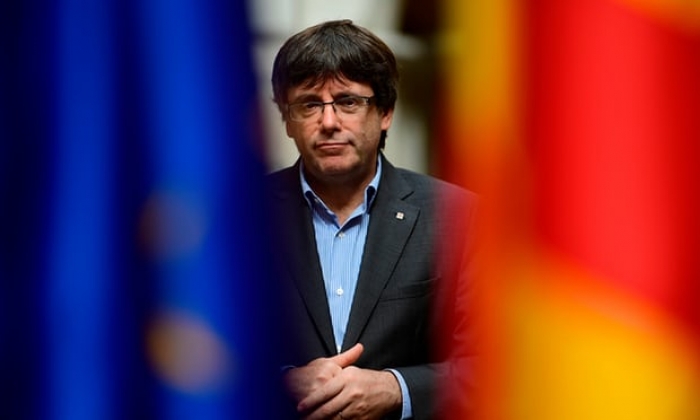The ambassador warned the UK may be the first to be affected if Catalonia breaks away after Sunday’s referendum. Bastarreche believes it would revive calls by Scottish nationalists for Scotland to stay in the EU after Brexit, and possibly create a split.
He said: “If the Catalan government succeed it will be a drama for Europe, starting with the UK, because it will mean that a region can disobey the rule of law.”
Numerous British commentators have suggested that the Spanish government should follow the example of Cameron’s coalition government, which granted the Scottish people a referendum.
The Catalan government is pressing ahead with a referendum in the face of obstruction by the Spanish executive, judiciary and the police. The Catalan parliament has declared that the result will be binding, but the Spanish government says it is illegal.
The possibility that Catalonia will be stripped of its legal powers of self-government, or even that the army will be sent in, has not been ruled out.
The Spanish court has also ordered public officials not to cooperate with the ballot, and has vowed to close any polling station, as well as seize ballot papers, in order to disrupt what has been decreed an illegal referendum called by the Catalan parliament in breach of procedures.
Bastarreche, who was appointed ambassador in February, said: “Catalan secessionist leaders are running a sort of slow-motion, low-cost coup d’etat, using soft violence, that has serious implications for European stability.”
He said comparisons to Cameron granting a Scottish referendum were “not valid or helpful to explain the situation in Catalonia because of Spain’s written constitution, which is a product of a different history”.
“This is not a dispute between Madrid and Catalonia. On the one side is a democratic Spain and its independent judicial system, and on the other side not Catalonia, but a group of radical nationalists and leftwing extremists in the regional power that are not complying with the law,” Bastarreche said.
He argued the UK was unusual in not having a written constitution, and most constitutions in Europe underline the indivisibility of the nation state. Catalonia joined the rest of Spain in endorsing the written constitution with a referendum in 1978.
Bastarreche said: “Most countries have written constitutions, and the Spanish one is a product of our 500-year history, and one of its central principles is the indivisibility of the kingdom.”
Although the Spanish government has the strong support of the UK government in its struggle with Catalonia, there is a frustration in Madrid that the British experience with the Scottish referendum has led to political sympathy for the Catalan demand for a legally recognised referendum.
Bastarreche said: “Bavaria cannot be a separate state and neither would the German court allow it. California has not been given the right to secede. The Spanish territory is not divisible but to fit its diversity there is a very decentralised system.
“There is nothing in international law that gives any region a right to self-determination in a democratic state.”
Spanish sources point out that even though Scotland was granted a referendum in 2014, now it was not being given the right to decide whether to remain inside the EU, even though Scotland voted heavily against Brexit.
Bastarreche added: “We have a rich cultural diversity, in particular the Basque country, Andalusia, Galicia and the Canary Islands, and Catalonia adds to that diversity. Without Catalonia, Spain is no longer Spain. States must always uphold the law.”
Explicit political support for the Catalan referendum in the UK has been confined to Scottish nationalists, and some Greens who have written to Spanish prime minister, Mariano Rajoy, criticising his methods.
Alan Duncan, the Europe minister, has said: “Spain is a great ally of the United Kingdom.” Asked about the situation in Catalonia, he insisted Theresa May’s government was “on the side of the rule of law and the Spanish constitution”.
More about: #Spain
















































